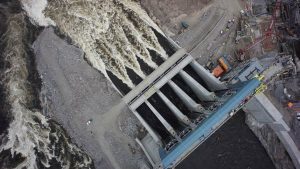
A journalist and editor for an independent newspaper in Newfoundland and Labrador is among 22 people facing an arrest order for violating a court injunction and trespassing at Nalcor Energy’s Muskrat Falls hydroelectric site in Labrador.
On Monday night, Justice George Murphy of the Supreme Court of Newfoundland and Labrador issued an order for the eviction of Indigenous demonstrators and the Independent’s Justin Brake, who has been covering the demonstrators’ protest at the site.
Brake called the court order an unprecedented attack on his constitutionally protected right to press freedom. “As far as I know, it’s the first time in Canadian history that that’s happened to a journalist,” he said in an interview with VOCM News.
Nalcor, a Crown energy corporation, is developing the Muskrat Falls site. The area’s largely Inuit community has met the project with sharp criticism and resistance.
“It’s particularly interesting to me that Indigenous people are at the forefront of [this], and there’s a suppression—seems to be a suppression, in my view—in mainstream media,” said Lenny Carpenter, a reporter with Journalists for Human Rights. “Indigenous people are under-represented in media coverage, and here we have a great opportunity to get some of that coverage.”
Carpenter added that the rights of journalists need to be protected if they are to report properly when covering contentious, possibly illegal situations.
22 protesters + any other persons unlawfully occupying project site ordered to appear in court no later than Nov. 10th #cbcnl #muskratfalls pic.twitter.com/4zbX8x09iZ
— Jacob Barker (@JacobBarkerCBC) October 25, 2016
“The biggest thing right now is that I’m able to continue to tell the story,” he said in an interview with Ricochet’s Ethan Cox. “If I end up staying and then getting arrested […] I can’t continue to tell that story.”
Earlier this month, Nalcor Energy announced that it could begin flooding the Muskrat Falls reservoir as early as October 15, despite a study that found that the projected flooding will increase levels of methylmercury by as much as 380 per cent if the reservoir is not fully cleared before flooding. Reservoir flooding has currently been put on hold.
When about 60 demonstrators stormed the worksite gate on Saturday and used bolt cutters to get inside, Brake didn’t hesitate to follow them.
“I know that my duty, my responsibility as a journalist was to tell this story, particularly in light of the broader context, which is that going through that gate were members of all three Indigenous groups in Labrador,” he said.
As an independent journalist, he was providing unique coverage on issues that “aren’t covered, for the most part, by mainstream media,” says Carpenter.
In addition to his coverage for the Independent, Brake has been reporting from within the Nalcor site via Facebook live videos. His coverage of activists storming the site’s gates has reached nearly 60,000 views.
Brake’s arrest order drew criticism from Canadian Journalists for Free Expression (CJFE), which described the order as a “clear violation of freedom of the press and an unacceptable assault on the public’s right to know.”
“Threatening journalists with arrest for covering these types of stories inevitably means that more of them will not be covered in the future,” the organization said in a statement on Wednesday.
The order has drawn comparisons to the recent arrest of Amy Goodman, a reporter for Democracy Now!, who was arrested while reporting on pipeline protests in North Dakota.
“Together, these incidents form a disturbing pattern of legal intimidation against journalists and media covering controversies over resource development projects and Indigenous-led protests,” wrote the CJFE.
Brake was unavailable for comment.

